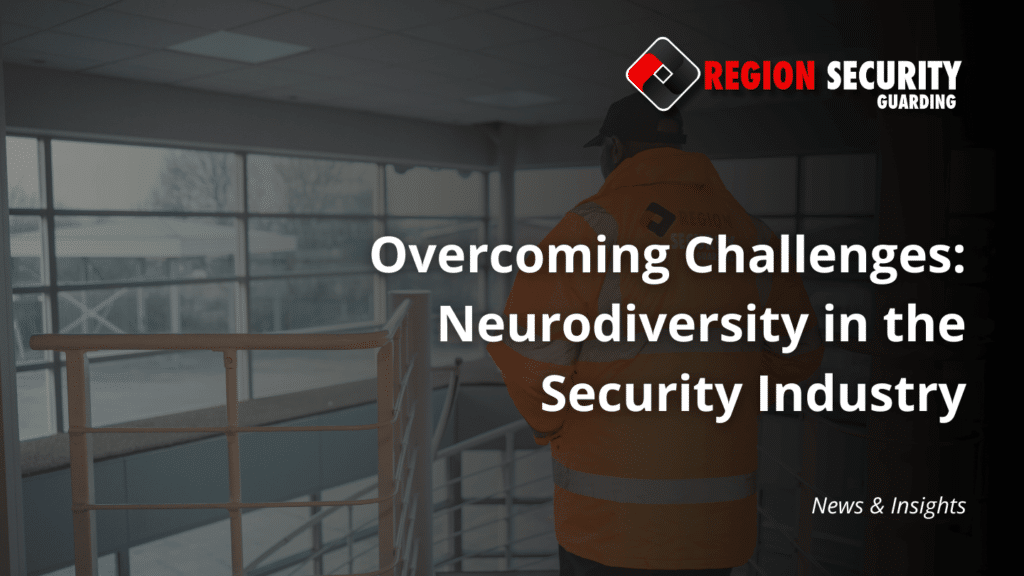The security industry is constantly evolving. It demands sharp attention to detail, strong problem-solving skills, and the ability to think outside the box. But what if the key to boosting security operations lies in embracing neurodivergent talent?
As we celebrate Neurodiversity Celebration Week, it’s the perfect time to recognise the unique strengths that neurodivergent individuals bring to the workplace. Supporting neurodiverse talent in security is powerful. Individuals with autism, ADHD, and dyslexia bring unique strengths to security roles. Their skills often align perfectly with the demands of the job.
heir heightened attention to detail, strong analytical thinking, and pattern recognition abilities can provide a valuable boost to security teams. Yet, many businesses overlook neurodivergent professionals due to outdated hiring processes or a lack of awareness
In this blog, we’ll explore why neurodiversity in the security industry is essential, the challenges neurodivergent professionals face, and how companies can create a more inclusive workforce.
Table of Contents

The Strengths Neurodivergent Individuals Bring to Security Roles
One of the biggest misconceptions about neurodivergence is that it creates limitations. In reality, many neurodivergent traits align perfectly with the demands of security work. This is why neurodiversity in the security industry needs to be recognised as a valuable asset. Here, we’re going to look at some specific reasons this recognition is so important:
1. Hyperfocus & Attention to Detail
Security professionals must stay alert and pick up on the smallest details. This is something that many neurodivergent individuals excel at.
Those with autism, for example, often have an exceptional ability to notice patterns, discrepancies, and irregularities that others might overlook. This skill is particularly useful in CCTV monitoring and access control. Embracing neurodiversity in the security industry means valuing these strengths and using them to improve security operations.
Many of these strengths are why neurodiverse security officers excel in their role. Their heightened observation skills make them well-suited to security positions that require precision and vigilance.
2. Strong Analytical & Problem-Solving Skills
Security challenges are rarely straightforward. Whether it’s identifying vulnerabilities in a system or responding to a security breach, problem-solving is a critical skill. Many neurodivergent people are natural problem solvers, able to think logically and strategically in high-pressure situations.
3. Innovative Thinking & Unique Perspectives
Embracing neurodiversity in security can lead to smarter, more innovative solutions. Research shows that companies with diverse thinking outperform competitors because different perspectives challenge assumptions and drive better decision-making.
Neurodivergent individuals often see patterns others miss and approach problems from unique angles. This makes them especially valuable in areas like fraud prevention, intelligence analysis, and threat detection. These are areas where thinking outside the box can be the key to staying ahead of threats.
Challenges Faced by Neurodivergent Professionals in Security
Despite their strengths, neurodivergent individuals often face unnecessary barriers when entering the security industry. Some of the most common challenges include:
- Hiring Biases – Many traditional hiring processes focus on social skills and eye contact rather than job-specific abilities. This can disadvantage neurodivergent candidates.
- Sensory Sensitivities – Security roles can involve loud environments, bright lights, or unpredictable scenarios, which may be overwhelming for people with heightened sensory sensitivity. Creating an inclusive workplace is key to supporting neurodiversity in the security industry.
- Communication Barriers – Standard workplace communication styles might not always match with how how some people naturally process and share information. Without adjustments, this can create misunderstandings or unnecessary difficulties in the workplace.
How the Security Industry Can Become More Inclusive
Creating a more inclusive security workforce doesn’t require drastic changes. Small adjustments can make a big difference. Here’s how businesses can better support neurodivergent security guards:
1. Rethink Hiring & Training Practices
Instead of relying solely on traditional interviews, companies can incorporate skills-based assessments to evaluate a candidate’s actual abilities. Offering alternative interview formats, such as structured Q&A or trial shifts can help neurodivergent candidates showcase their strengths in a fairer way.
These inclusive hiring practices would support neurodiverse talent in the security sector, and help businesses don’t miss out on valuable skills.
2. Introduce Workplace Adjustments
Simple modifications can make security jobs more accessible and comfortable for neurodivergent employees. Supporting neurodiversity in the security industry through workplace adjustments can help individuals thrive. These may include:
- Providing noise-canceling headphones for roles in loud environments.
- Adjusting lighting to reduce sensory discomfort.
- Offering flexible break schedules.
- Providing clear, structured routines and written instructions to improve job performance.
Businesses that take steps to accommodate neurodivergent employees create a more inclusive and productive workforce. For example, Region Security Guarding has embraced this approach by putting supportive measures in place tailored to the needs of neurodiverse team members.
3. Encourage Neurodivergent Leadership
Inclusion shouldn’t stop at hiring. Neurodivergent professionals should be given opportunities to lead. Promoting people into supervisory or managerial roles brings fresh perspectives to security operations. Plus, it also helps build a more inclusive culture.
Embracing Neurodiversity: The Future of Security
The security industry thrives on precision, analytical thinking, and problem-solving. These are all qualities that neurodivergent individuals often excel at. By breaking down barriers and creating a more inclusive work environment, businesses can tap into a pool of highly skilled professionals who bring a fresh approach to security challenges.
Now is the time to rethink how we recruit, support, and develop neurodivergent talent in the security sector. The result? A more adaptable, innovative, and effective security workforce.
Is your business ready to lead the way?




